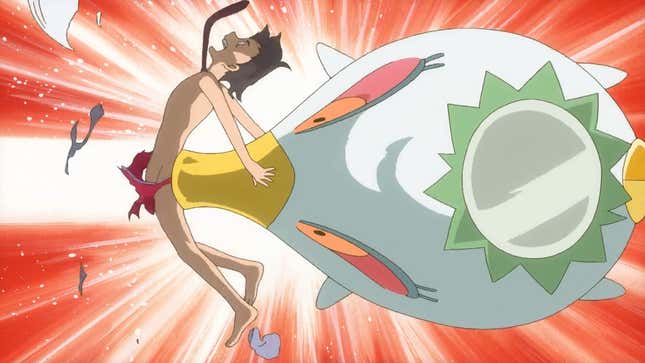
When it comes to the work of anime director Kunihiko Ikuhara, you either connect with it or you don’t.
Ever since the director, writer, provocateur, and social critic made his mark in 1997 with Revolutionary Girl Utena, he has delivered nothing but ambitious and surreal anime that deliberately addresses (and comments on) systems and major events taking place in Japanese society. Sarazanmai, his first new series in four years, is no exception.
Sarazanmai, currently streaming on Crunchyroll and Funimation Now, follows three middle-school-aged boys living in Asakusa, a district of Tokyo. All three boys share a love for the Brazilian soccer player Neymar, and all three are withholding a deep secret about themselves.
Kazuki, who’s recently quit his school’s soccer team, spends each day cross-dressing as Sara Azuma, a local TV idol. Azuma serves as a Greek chorus for the series, leaving messages that foreshadow events yet to occur and only make real sense once you have taken in the series as a whole. The use of a Greek chorus is a recurring trope in Ikuhara’s work, appearing in the form of the “Shadow Dancers” in Utena and the Double H train ads in 2011’s Mawrau Penguindrum. Kazuki takes selfies while dressed as Azuma, sending them to his younger brother, Haruka, who thinks they are pictures of the real Azuma and subsequently believes he has a real online friendship with the celebrity.
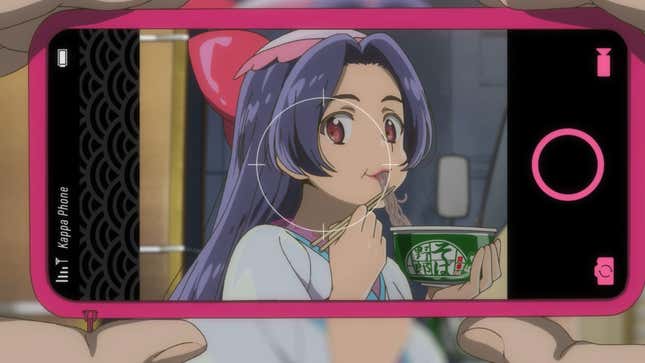
Enta, Kazuki’s best friend, is upset that Kazuki has quit the soccer team, not only because they can no longer play on the pitch together, but also because Enta is secretly in love with Kazuki. Finally, there is Toi, a recent transfer student who wants nothing more than to leave Asakusa behind so that he can join his brother Chika, who is currently a wanted fugitive, in a life of organized crime.
One morning, while attempting to take a selfie, Kazuki accidentally photographs Toi trying to break into a car. A chase ensues, ending in front of a golden kappa statue. Kappa are frog-like creatures based on Japanese folklore that date back to the Edo period. Recognizing Kazuki thanks to his cell-phone charm, Toi takes a swipe at him with his weapon of choice, a steel ruler. He misses and strikes the statue, destroying it. This releases Keppi, the marshmallow-shaped, cucumber-obsessed Prince of the Kappa Kingdom.
Later that day, after realizing what they both experienced was not a dream, and continually hearing a ringing sound, Kazuki and Toi return to the shrine. They find Keppi there, waiting. After mislabeling him as a “frog” twice, the boys anger Keppi, who builds up some steam and then propels himself at the boys.
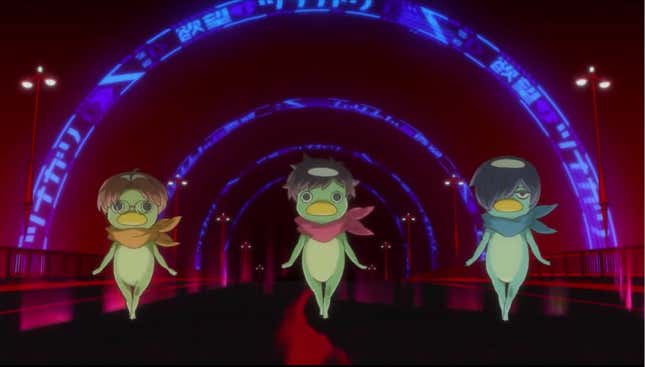
What happens next has become the main talking point of the series, and perhaps the craziest idea Ikuhara has pulled off since the climax of 1999’s Adolescence of Utena, in which he transformed his protagonist from a high school girl to a blazing hot pink sports car.
Keppi swallows Kazuki whole, butt first. He then does a little dance and flies into the camera. We are taken inside his mouth where we witness–in a stylized manner–a small, glowing white orb being removed from Kazuki’s buttocks. This, Keppi tells us, is his “shirikodama,” or “butt ball.”
The shirikodama itself is not an invention of Kunihiko Ikuhara’s, but part of ancient kappa folklore. It’s said to contain the human soul, and is something kappa often try to steal from their victims. When Ikuhara first pitched the series, he said he made sure to not mention anything involving butts, knowing that it was unlikely to get approved. It was only after the series was in production that he revealed to the crew that shirikodama would be a major element of the plot.
When Kazuki awakens, he realizes he’s not only been taking to the yokai, or spirit world, but that he has also been turned into a kappa. He then witnesses Toi being pushed out of Keppi’s butt, having been turned into a kappa as well. Enta, looking for Kazuki, ends up in the wrong place at the wrong time, and meets the same fate as the other two.
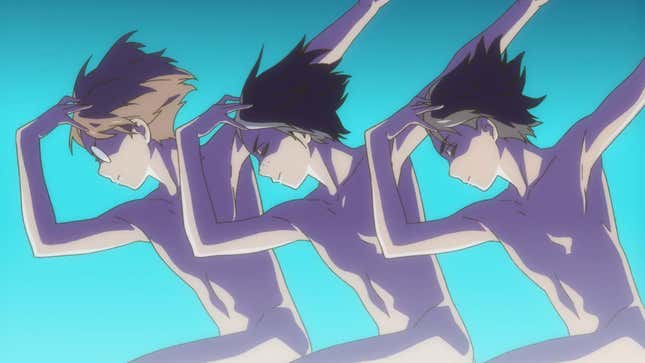
In order to retrieve their shirikodama from Keppi and revert back to human form, they must battle against Kappa-Zombies, people who have been kidnapped, killed, had their desires extracted from them, turning them into monsters. The duo behind it are Reo and Mabu, two police officers who secretly work for the Otter Empire, the enemy of the Kappa Kingdom.
To defeat the zombies, the boys first have to remove the zombie’s shirikodama by thrusting themselves into its anus and removing it by hand. Once they remove it, they see just what kind of secret desire the victim was withholding. They could be a serial scammer who is obsessed with kissing women, or someone who likes to paint his head like a soccer ball and have his lover kick him with force. And that’s just step one.
Once they remove the shirikodama, one of the boys then has to swallow it and then connect psychically with the other two. This is the process that gives the show its name; sarazanmai means “three plates,” referring to the bowls of water atop kappas’ heads. But in doing so, the boys leak information to each other. In the premiere episode, after digesting the shirikodama, Kazuki’s cross-dressing exploits are revealed. Once that connection is made, Keppi eats the zombie’s shirikodama and the boys revert to normal. Once they complete their goal they are given a “dish of hope.” If someone were to collect five silver dishes of hope, Keppi tells them, they would grant them any wish they desired—but only to one person.
Got all that? If you don’t, that’s OK. It’s all part of Ikuhara’s twisted design.
Whenever a new Ikuhara series premieres, you have to be prepared to experience all of Ikuhara. You have to be ready to see all of his ambitions, ideas, and commentary. He also likes to deliberately keep information from his audience until the last possible minute. Expect to see a lot of repeated animation sequences as well, one of his most familiar tropes and one of the biggest criticisms that fans levy at his work. Some people grow tired of the repetition of scenes like the “Absolute Destiny: Apocalypse” sequence in Utena and the “Survival Strategy” sequence in Penguindrum, although I’m not one of them.
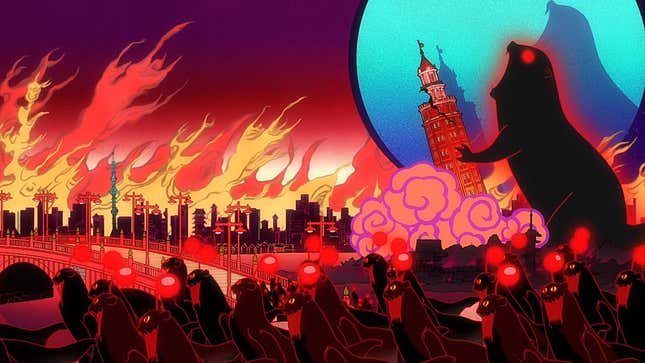
It’s something that’s just been drilled into him since his days at Toei Animation, where he first started in the anime industry. It was at Toei that he got to work on his first major series, Sailor Moon, taking over series director duties on Sailor Moon R from his mentor Junichi Sato starting with episode 60. Ikuhara would go on to direct Sailor Moon S, SuperS, and Sailor Moon R: The Movie before leaving Toei.
His series since then, like Utena, Penguindrum, and Yurikuma Arashi, are known to be overwhelming, confusing, indulgent, and genius. The main reason that Sarazanmai was the series I was most excited to see, in what has been an overall lackluster anime season, is because whether I enjoyed it or not, there truly is no one else in anime even attempting a work like this.
In every Ikuhara production, the director likes to touch on a number of themes while also making swift and cutting commentary on how systems work to oppress people in modern society. In Utena, the theme was adolescence, Ikuhara exploring it while also trashing the toxic and repressed environment that comes with living under a patriarchal system. In Penguindrum, he touched on the importance of family, all while directly attacking capitalism.
In his last series, 2015’s Yurikuma Arashi, the focus was on love, specifically love between two women. He took to task not only the “Yuri” genre and its tropes, but also those who strictly believe in heteronormativity, the very boring and small-minded belief that the only kind of “normal” sexual relationship possible is between a man and a woman, and that those who don’t want to follow that should be ostracized from society.
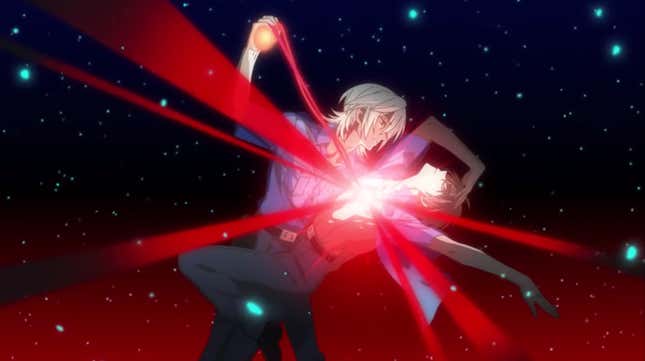
With Sarazanmai, Ikuhara is exploring both desire and connections.
All of the major characters in this series are having difficulties connecting. Kazuki believes he doesn’t deserve any connections at all, that feeling stemming from the guilt he feels about his relationship to his family, specifically Haruka. Enta wants to have a romantic connection with Kazuki, but because he fears that those feelings may not be reciprocated, he withholds his desire to be open with the person he cares for the most. This leads him to act irrationally and also become very possessive of Kazuki.
Toi wants to hold onto the connection he has with his brother, the closest family member he has left after the death of his parents. What Toi may not be aware of is that by clinging only to the connection he has with his brother, he’s ignoring the connections he had, like soccer, and the connections he is currently making with Kazuki and Enta. Our heroes are not the only ones having connection issues, either. Reo is angry that he can not connect with Mabu like he once did before, the two being manipulated by the Otter, who is an “abstract concept” (his words) and is made to represent desire.
Before Reo and Mabu extract someone’s desire, turning them into a Kappa-Zombie, they mention how the victim has no connection, no way to express their desire.
The system that Ikuhara is tackling with Sarazanmai is materialism. All of the Kappa-Zombies revolve around a theme: boxes, soccer balls, soba noodles. The boys only realize there is a Kappa-Zombie in the area when whatever theme fits the Zombie starts falling out of peoples hands and homes and toward the monster. The inspiration for this comes from the most significant event in Japan’s history post-WWII.
The Tōhoku earthquake and tsunami that happened on March 11, 2011, is the most devastating natural disaster to hit Japan. Over 15,000 people were killed, it cost the nation 16.9 trillion yen in damages, and over 150,000 people were displaced from their homes after water from the tsunami caused numerous meltdowns and explosions at the Fukushima Daiichi Nuclear Power Plant. It was the most significant nuclear disaster since Chernobyl. Speaking to The Japan Times, Ikuhara said that after the events of March 11, “we’ve learned that material things can be damaged and are not eternal.”
This isn’t the first time Ikuhara has used past events in Japan’s history for inspiration. Penguindrum made explicit references to the 1995 sarin attack in the Tokyo subway. The attack was carried out a cult made up of people who felt alienated and lost after the Japanese economy went under in the 1990s. He doesn’t make excuses for their actions, but he wants people to understand what led them to perform such an act in the first place. The same goes for the people who become Kappa-Zombies. Some of them are not good people, but they all have desires that are not being fulfilled, mainly because they feel like if they put those desires out into the open, they fear people will not understand or cast them out.
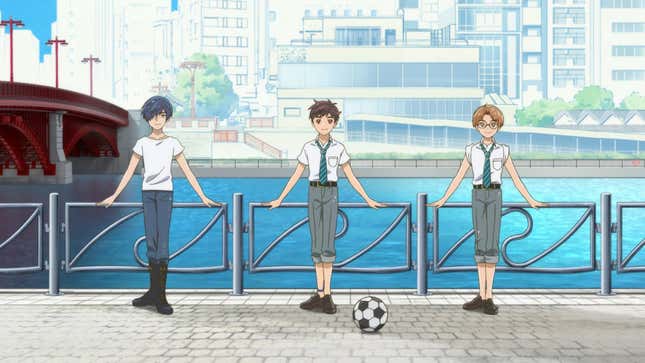
What Ikuhara is trying to convey in this series is that if you have the desire to connect with someone or something, you shouldn’t let fear keep you from trying to make that connection. Yes, you may get hurt, or disappointed, or put down for what you desire to do, but that doesn’t mean you shouldn’t keep trying. It may be foolish, but desire is not something you can buy on a website and have some underpaid factory worker put in a box and deliver to you—it’s something that you have from the moment you enter this world to the second you leave it, a reminder that you are a person and that you are alive. And to make those connections, the ones that matter, means we have to not only connect with one another, but understand each other. It’s a message that Ikuhara repeats in all of his series, and one that he apparently still feels like he has to say.
Sarazanmai is a positive step forward for Ikuhara’s career after the messy Yurikuma Arashi, which was troubled by production issues and Ikuhara focusing more on lore and symbolism rather than development. Many attributed that to Arashi being the shortest series Ikuhara had ever worked on, at just 12 episodes. But Sarazanmai, which is one episode shorter, doesn’t seem to have that same problem. It’s his most optimistic, streamlined and realistic (yes, really) series to date, one that doesn’t lose itself in the lore, but instead is focused on its message and the arcs of its characters. He accomplishes this while keeping what makes his series so unique and refreshing even in the strongest of anime years.
It’s always a good thing whenever Ikuhara returns to offer us more commentary, more symbolism, more Ikuhara. While I don’t think he can ever truly go back and get to make a 20-plus episode series, two decades after starting a revolution, he still has that spirit, not in his butt, but in his heart.
Christopher Lee Inoa is a freelance film and animator reporter living in a un-gentrified portion of New York City. Follow him on Twitter @ChrisLInoa.